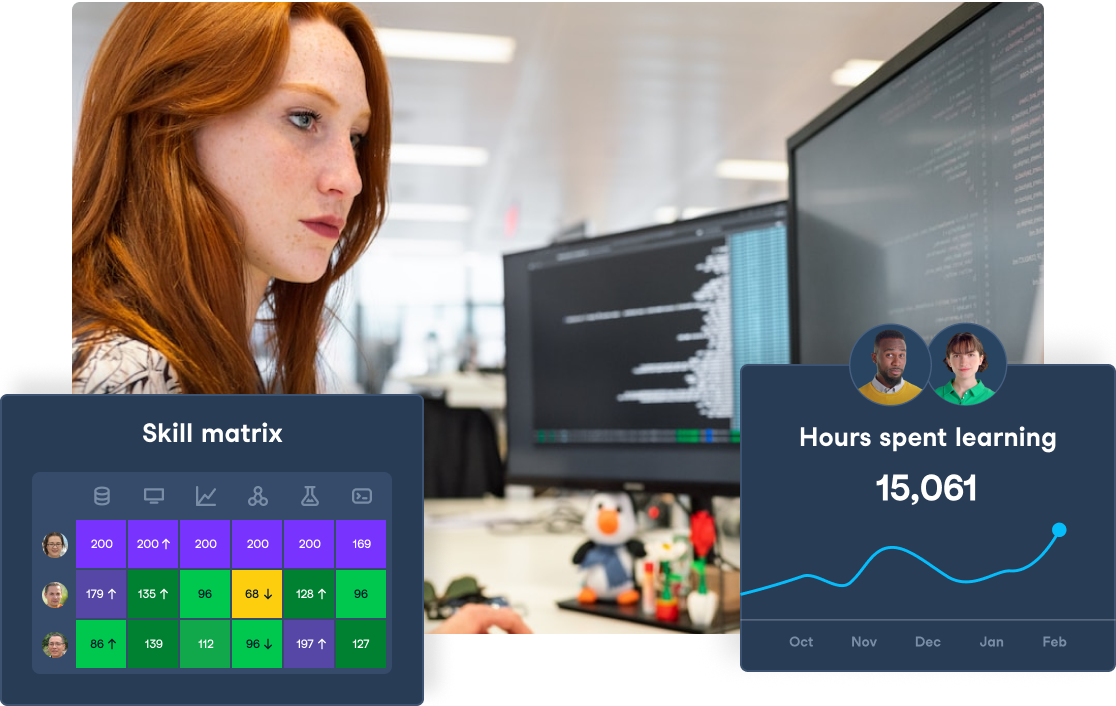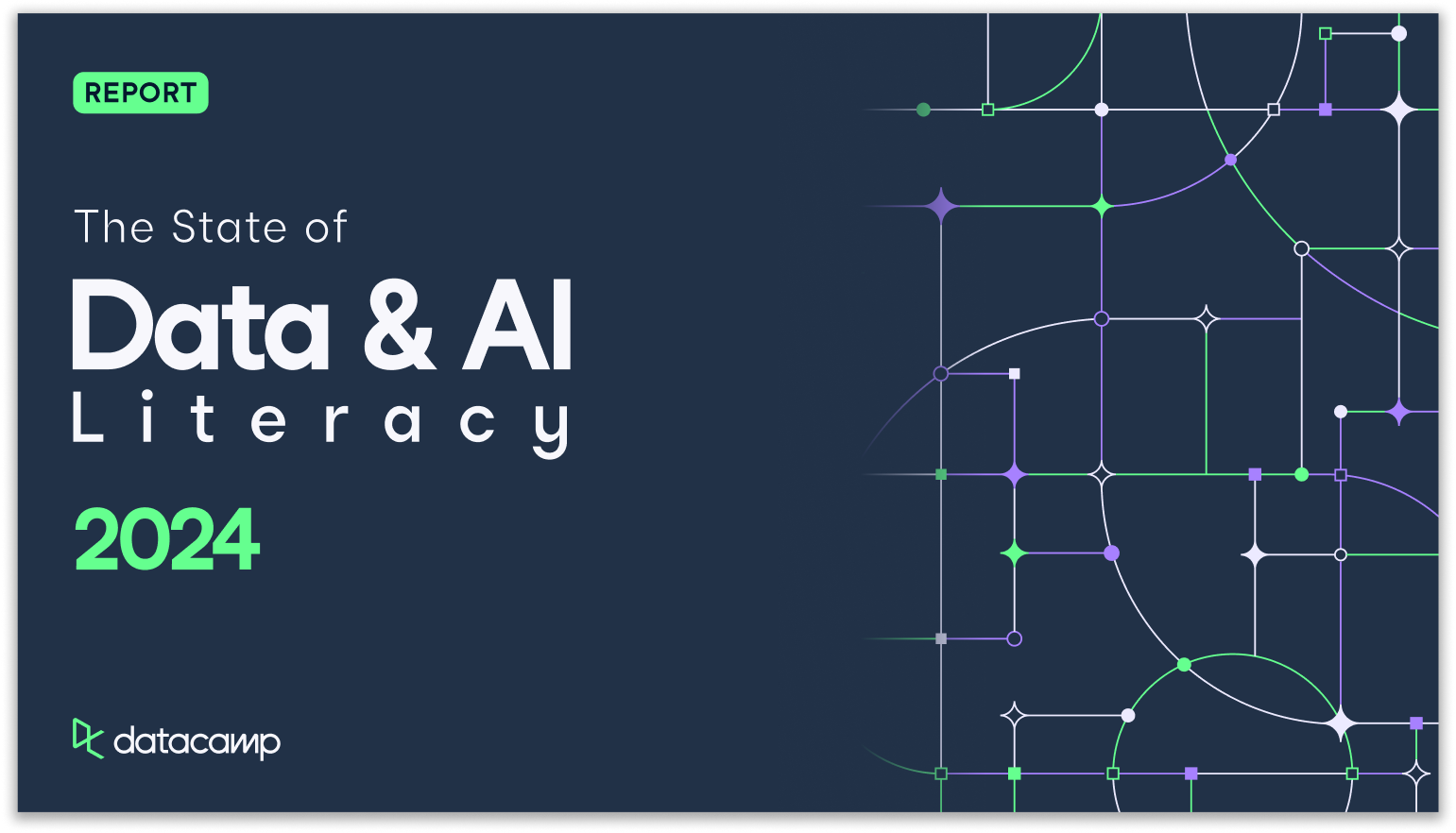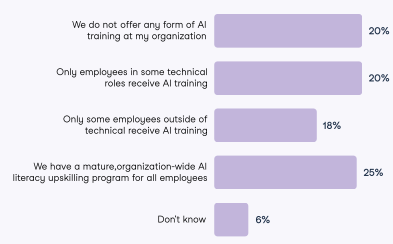Cursus
On estime qu'un adulte moyen prend 35 000 décisions par jour. Dans le monde du travail, nous prenons constamment des décisions basées sur un ensemble changeant de variables et de données.
L'amélioration du processus de prise de décision est l'un des principaux moteurs de la réussite commerciale d'une entreprise. Mais comment pouvons-nous utiliser les données et les analyses pour rendre nos décisions plus intelligentes ? Mieux encore, comment pouvons-nous créer des solutions qui éliminent l'ambiguïté, l'incohérence et la fatigue auxquelles les humains sont enclins et les remplacent par des compétences autonomes et cognitives ? La réponse pourrait être l'IA.
Dans cet article, nous analyserons l'IA dans la prise de décision. Nous aborderons les principales applications et les avantages de la prise de décision à l'aide de l'IA et nous verrons comment les entreprises de tous les secteurs se tournent vers l'IA pour prendre des décisions plus informées, plus précises et basées sur des données dans leurs flux de travail.
Améliorez les compétences de votre équipe en matière d'IA
Transformez votre entreprise en dotant votre équipe de compétences avancées en matière d'IA grâce à DataCamp for Business. Améliorez vos connaissances et votre efficacité.

Comment l'IA transforme-t-elle la prise de décision ?
L'IA transforme les processus décisionnels des entreprises de deux manières principales : en soutenant des décisions éclairées et fondées sur des données et en automatisant les tâches répétitives. Examinons chacun d'entre eux plus en détail.
Des informations fondées sur des données
Les outils d'IA peuvent traiter les informations beaucoup plus rapidement et avec plus de précision que les humains. Ces technologies permettent de réaliser des analyses prédictives, de reconnaître des modèles dans de vastes ensembles de données et de prendre des décisions automatisées, aidant ainsi les entreprises à acquérir un avantage concurrentiel dans leurs industries et leurs secteurs.
La prise de décision assistée par l'IA peut être utilisée dans de nombreux domaines du monde du travail :
- Recrutement. L'IA peut analyser les données historiques, prévoir les besoins futurs en matière d'embauche et évaluer les candidats pour aider les recruteurs à prendre des décisions plus éclairées.
- Gestion du temps. Les outils de gestion du temps alimentés par l'IA peuvent prédire le temps qu'il vous faut pour accomplir une tâche spécifique et ajuster le temps estimé pour la réaliser à l'avenir. Ils peuvent également découvrir les heures où vous êtes le plus productif et vous assigner des tâches prioritaires pendant ces heures.
- Marketing. L'IA est utilisée dans le marketing pour analyser le comportement des clients, personnaliser le contenu et les offres, et optimiser les campagnes pour obtenir de meilleurs résultats.
Vous êtes curieux de savoir comment l'IA peut aider les entreprises à prendre des décisions ? Pour en savoir plus, consultez notre cours sur la prise de décision fondée sur les données pour les entreprises.
Automatisation des tâches répétitives
L'un des avantages les plus concrets de l'IA dans les opérations commerciales est sa capacité à automatiser les tâches répétitives. Les possibilités sont infinies. Les domaines qui pourraient bénéficier de l'automatisation de l'IA sont la gestion de projet, l'assistance à la clientèle et l'optimisation de la chaîne d'approvisionnement. Il s'agit souvent d'activités qui prennent du temps et qui, bien que nécessaires, ne contribuent pas directement à la croissance ou à l'innovation de l'entreprise.
En détectant les goulets d'étranglement et les processus inefficaces, et en identifiant les moyens de rationaliser les opérations, l'IA peut aider votre entreprise à accroître ses performances et à réduire ses coûts. Cela se traduira par un gain de temps pour les employés, qui pourront se concentrer sur des activités à plus forte valeur ajoutée nécessitant de la créativité humaine, une réflexion critique et une prise de décision stratégique.
L'IA pourrait également être la pierre angulaire des efforts déployés par les entreprises pour réduire le temps de travail et accroître la satisfaction des employés.
Applications de l'IA dans la prise de décision
Examinons quelques exemples plus spécifiques d'utilisation de l'IA dans la prise de décision :
Décisions stratégiques des entreprises
Montrez comment l'IA aide les entreprises à prendre des décisions à long terme, telles que l'expansion du marché ou le développement de produits, en utilisant l'analyse prédictive..
L'IA dans la gestion des risques
L'intégration de l'IA dans les systèmes de gestion des risques modifie la façon dont les entreprises abordent les incertitudes. En identifiant les corrélations dans d'énormes ensembles de données au-delà de ce qui est perceptible par les humains, les systèmes d'IA peuvent permettre de meilleures analyses prédictives, la planification de scénarios et l'évaluation des risques dans des domaines tels que la finance, la cybersécurité et l'industrie manufacturière.
Expériences personnalisées pour les clients
L'IA offre aux entreprises un moyen efficace et efficient d'accroître leur capacité à servir davantage de clients à un coût considérablement réduit. En reproduisant et en augmentant les capacités humaines, les chatbots alimentés par l'IA peuvent collecter et croiser des informations pour élaborer des réponses et des solutions aux problèmes spécifiques des clients, ce qui stimule la satisfaction et l'engagement de ces derniers.
Consultez notre article distinct pour découvrir comment l 'IA révolutionne le service client pour en savoir plus.
Exemples d'utilisation de l'IA dans la prise de décision dans tous les secteurs d'activité
Les implications de l'intelligence artificielle pour la prise de décision s'étendent à de multiples secteurs. Voici quelques exemples :
L'IA dans la finance
Il existe de nombreux cas d'utilisation de l'IA dans la finance, un secteur qui a toujours été pionnier dans l'utilisation des nouvelles technologies pour rendre l'activité plus sûre et plus rentable. Agus Sudjianto l'explique dans ce podcast:
En termes d'applications pour la banque et la finance, nous utilisons l'IA dans un grand nombre de cas d'utilisation, des tâches banales au traitement de l'information et à la surveillance.
Agus Sudjianto, Executive Vice President, Head of Corporate Model Risk at Wells Fargo
Voici quelques exemples :
- Détection de la fraude. L'analyse de la fraude en temps réel, alimentée par l'IA, permet une intervention immédiate et empêche les transactions non autorisées, protégeant ainsi à la fois l'institution financière et ses clients.
- Gestion des risques. AI s'appuie sur des algorithmes pour analyser des ensembles de données vastes et complexes, identifier des modèles et prédire des résultats, aidant ainsi les banques et les institutions financières à atténuer les risques plus efficacement en détectant les activités suspectes ou anormales. Cela permet de prendre des décisions éclairées en matière d'investissements, de prêts, de souscription d'assurance, etc.
- Service à la clientèle. Les banques utilisent également l'IA pour proposer des recommandations de produits personnalisées aux clients en fonction de l'historique de leurs transactions et de leurs habitudes de consommation. Cela améliore non seulement l'expérience du client, mais aussi les taux de conversion.
L'IA dans les soins de santé
Les technologies de l'IA sont utilisées dans différentes combinaisons pour résoudre des problèmes dans le secteur des soins de santé. Voici quelques exemples d'application de l'IA aux soins de santé.
- Imagerie médicale et diagnostics. L'IA a révolutionné l'imagerie médicale et les diagnostics en fournissant des outils qui améliorent la précision et l'efficacité de la détection des maladies. Vous pouvez en apprendre davantage à ce sujet dans le cours Biomedical Image Analysis in Python (Analyse d'images biomédicales en Python ) de DataCamp.
- Découverte et développement de médicaments. L'IA joue un rôle crucial dans l'accélération du processus de découverte et de développement de médicaments, en réduisant le temps et les coûts associés à la mise sur le marché de nouveaux traitements.
- Initiatives en matière de santé publique. L'IA soutient les efforts de santé publique en fournissant des outils pour la surveillance des maladies, la prévision des épidémies et les stratégies de prévention.
- Administration des soins de santé. L'IA est de plus en plus utilisée pour améliorer l'efficacité des opérations de soins de santé, de la programmation à l'inventaire et plus encore.
L'IA dans l'industrie manufacturière
Ces dernières années, l'IA a fait des progrès révolutionnaires dans l'industrie manufacturière en raison des quantités importantes de données sur lesquelles elle s'appuie. Vous trouverez ci-dessous quelques-uns des cas d'utilisation les plus illustratifs de l'IA dans l'industrie manufacturière.
- Maintenance prédictive. Des outils d'IA ont été développés pour prédire le moment idéal pour réparer ou remplacer les équipements industriels, ce qui permet d'économiser du temps et de l'argent.
- Contrôle de la qualité et inspection. Les produits manufacturés font souvent l'objet d'un certain niveau de contrôle de la qualité afin de s'assurer qu'ils sont de bonne qualité avant d'être mis entre les mains des consommateurs. Des outils d'IA, tels que des caméras et des capteurs, ont été mis au point pour améliorer l'inspection complète des outils afin de tester les produits avant qu'ils n'arrivent sur le marché.
- Gestion de la chaîne d'approvisionnement. La gestion de la chaîne d'approvisionnement est un bon exemple de l'utilisation de l'IA dans l'industrie manufacturière. Les fabricants doivent généralement traiter des millions de commandes, d'achats, de matériaux, d'ingrédients, etc. Le traitement manuel de ces processus affecte considérablement le temps et les ressources des personnes, c'est pourquoi de plus en plus d'entreprises se tournent vers l'IA pour améliorer leurs processus de chaîne d'approvisionnement.
Avantages et défis de l'IA dans la prise de décision
Comme pour toutes les avancées technologiques, l'utilisation de l'IA dans la prise de décision a des implications à la fois positives et négatives :
Principaux avantages
La mise en œuvre de l'IA pour soutenir les processus de prise de décision présente trois avantages principaux :
Amélioration de l'efficacité
Selon McKinsey, l'IA a le potentiel d'automatiser 60 à 70 % des activités professionnelles, aidant ainsi les employés à se concentrer sur les tâches à forte valeur ajoutée. Ce type d'automatisation a été mis en œuvre dans plusieurs secteurs afin d'accroître l'efficacité en déplaçant les ressources vers des rôles plus stratégiques.
La Harvard Business School indique également que les entreprises qui exploitent l'IA pour l'automatisation des flux de travail constatent des gains de productivité mesurables. Les outils d'IA améliorent non seulement l'efficacité des employés en supprimant les tâches répétitives, mais ils rationalisent également les flux de travail, ce qui stimule la productivité et l'efficacité opérationnelle.
Réduction des coûts
IBM fait état de réductions de coûts substantielles obtenues grâce à la maintenance prédictive pilotée par l'IA, avec des exemples comme celui d'une société minière qui a utilisé l'IA pour réduire les temps d'arrêt de 30 %. Les modèles prédictifs basés sur l'IA peuvent prévoir les besoins de maintenance des équipements, ce qui permet d'éviter les pannes coûteuses et de réduire les interruptions opérationnelles.
Dans les opérations de la chaîne d'approvisionnement d'IBM, les solutions basées sur l'IA ont permis d'économiser 160 millions de dollars et de maintenir un taux d'exécution des commandes de 100 % pendant la pandémie de COVID-19. Cela montre comment l'IA peut être utilisée stratégiquement pour réduire les coûts en optimisant les ressources et en minimisant les temps d'arrêt.
Une prise de décision plus précise et plus rapide
L'IA améliore la prise de décision en analysant rapidement des ensembles de données complexes, ce qui facilite les prévisions et la gestion des risques. Cela permet de prendre des décisions plus rapides et plus précises, comme le démontrent les modèles d'analyse prédictive qui aident les entreprises à anticiper les évolutions du marché et les demandes des clients, ce qui leur confère un avantage concurrentiel .
La capacité de l'IA à traiter de grands ensembles de données et à extraire des informations en temps réel donne aux entreprises un avantage en matière de planification stratégique fondée sur les données. Selon Gartner, 79 % des stratèges d'entreprise estiment que l'IA est essentielle à la réussite de leur entreprise, soulignant son rôle crucial dans l'obtention d'un avantage concurrentiel grâce à l'amélioration de la prise de décision.
Nous avons constaté la même chose dans le rapport 2024 sur l'état des données et la maîtrise de l'IA. 62% des dirigeants estiment que la maîtrise de l'IA est désormais importante pour les tâches quotidiennes de leurs équipes.
Téléchargez le rapport sur l'état de la maîtrise des données et de l'IA en 2024.
Découvrez ce que 550+ leaders aux États-Unis et au Royaume-Uni pensent de l'état des compétences de leurs équipes en matière de données et d'IA.

Défis
Si les avantages de l'IA sont évidents, la mise en œuvre d'une solution d'IA efficace n'est pas toujours facile et sans risque. Analysons les défis les plus importants.
- Les préjugés et la discrimination. Les modèles d'IA biaisés peuvent donner lieu à des décisions injustes qui exacerbent souvent la discrimination, en particulier à l'encontre des groupes minoritaires.
- Questions relatives à la protection de la vie privée. Les modèles d'IA sont formés à partir de vastes quantités de données, principalement extraites sans discernement de l'internet. Dans de nombreux cas, ces données contiennent des données à caractère personnel. Cela peut entraîner des problèmes et des risques liés à la confidentialité et à la sécurité des données.
- Manque d'intuition humaine dans les décisions complexes. Si la capacité unique de l'IA à traiter de grandes quantités de données est essentielle pour améliorer la prise de décision, l'intuition et le sens des affaires jouent toujours un rôle important. Si ces compétences font défaut, les chefs d'entreprise risquent de prendre de mauvaises décisions.
- Dépendance excessive à l'égard des systèmes automatisés. C'est le revers de la médaille. Une dépendance excessive à l'IA peut avoir un impact significatif sur la prise de décision en favorisant la dépendance et en diminuant potentiellement les capacités de jugement individuelles.
L'avenir de l'IA dans la prise de décision
À l'avenir, l'importance de l'IA dans les environnements professionnels est appelée à croître de manière exponentielle. Les technologies d'IA évoluant à un rythme rapide et leurs applications se développant dans divers secteurs, l'IA offrira un avantage concurrentiel aux entreprises qui réussiront à l'intégrer dans leurs activités quotidiennes, à la fois en soutenant la prise de décision fondée sur les données et en automatisant les tâches répétitives.
Les possibilités pour les entreprises sont infinies. Cependant, comme le montre le rapport State of Data & AI Literacy Report 2024 de DataCamp, malgré les progrès réalisés au cours des années précédentes, la formation à l'IA reste balbutiante, ce qui signifie que les entreprises devront faire des investissements supplémentaires dans la formation à l'IA pour exploiter tout le potentiel de cette technologie.

Quelle est la meilleure description de l'état de la formation à l'IA dans votre organisation ? Source : DataCamp
Garder une longueur d'avance avec la formation à l'IA
Si vous êtes déterminé à mettre en œuvre l'IA pour soutenir la prise de décision dans tous les domaines de votre entreprise, vous devriez vous lancer. Mais n'oubliez pas que vous n'irez pas plus loin dans votre démarche si vous n'avez pas les bonnes personnes pour mettre en pratique votre stratégie d'IA.
La mise en œuvre et la gestion des systèmes d'intelligence artificielle nécessitent une main-d'œuvre qualifiée. Les scientifiques des données, les spécialistes de l'IA et les autres professionnels possédant une expertise en matière d'IA et d'apprentissage automatique sont essentiels au développement, à l'interprétation et à la gestion de ces technologies.
Recruter et fidéliser des talents possédant l'ensemble des compétences requises peut s'avérer difficile, notamment en raison de la concurrence qui règne sur le marché des professionnels de la technologie. Investir dans la formation et le développement du personnel existant peut également contribuer à combler le déficit de compétences et à garantir que l'organisation puisse exploiter pleinement les capacités de l'IA.
Heureusement, DataCamp est là pour vous aider. Grâce à notre solution DataCamp for Business, nous pouvons aider votre entreprise à se familiariser avec les données et l'IA. Avec une solution évolutive qui peut fonctionner pour des équipes de toute taille, ainsi que des parcours d'apprentissage personnalisables et des rapports détaillés, DataCamp for Business peut vous aider à transformer votre entreprise et à devenir prêt pour l'IA.
Demandez une démo pour voir comment DataCamp peut vous guider dans le processus de montée en compétences de toute votre équipe, de construction d'une culture positive à l'égard de l'IA et de mise en œuvre d'une prise de décision en matière d'IA sur votre lieu de travail.
Améliorez les compétences de votre équipe en matière d'IA
Transformez votre entreprise en dotant votre équipe de compétences avancées en matière d'IA grâce à DataCamp for Business. Améliorez vos connaissances et votre efficacité.

Conclusion
L'IA est la technologie la plus révolutionnaire de notre époque. Un nombre croissant d'entreprises l'adoptent déjà pour automatiser et optimiser leurs pratiques, réduire leurs coûts opérationnels, prendre de meilleures décisions et créer de meilleurs produits.
Au fur et à mesure que l'IA s'intègre dans l'ADN des entreprises, de nouvelles et meilleures pratiques en matière d'IA verront le jour. Par conséquent, les entreprises qui maîtrisent les principes fondamentaux de l'IA sont susceptibles d'avoir une longueur d'avance sur leurs concurrents.
En attendant, nous vous recommandons vivement de rester à l'écoute de l'IA et de la technologie qui la sous-tend grâce aux documents DataCamp suivants :
- Principes de base de l'IA pour les entreprises
- L'intelligence artificielle pour les dirigeants d'entreprise
- Cours sur la mise en œuvre de solutions d'IA dans les entreprises
- Cours sur l'IA générative pour les entreprises
- La science des données, la maîtrise des données et la formation à l'IA au service de votre entreprise
- Former votre équipe aux données et à l'IA
- Plateforme de premier plan pour la maîtrise des données dans l'ensemble de votre entreprise
- Cours sur la prise de décision fondée sur les données pour les entreprises
- Prise de décision fondée sur des données : Un guide pour les entreprises

Je suis analyste de données indépendant et je collabore avec des entreprises et des organisations du monde entier dans le cadre de projets de science des données. Je suis également formateur en science des données avec plus de 2 ans d'expérience. Je rédige régulièrement des articles sur les sciences des données en anglais et en espagnol, dont certains ont été publiés sur des sites web réputés tels que DataCamp, Towards Data Science et Analytics Vidhya En tant que scientifique des données ayant une formation en sciences politiques et en droit, mon objectif est de travailler à l'interaction des politiques publiques, du droit et de la technologie, en tirant parti du pouvoir des idées pour faire avancer des solutions et des récits innovants qui peuvent nous aider à relever des défis urgents, à savoir la crise climatique. Je me considère comme un autodidacte, un apprenant permanent et un fervent partisan de la pluridisciplinarité. Il n'est jamais trop tard pour apprendre de nouvelles choses.